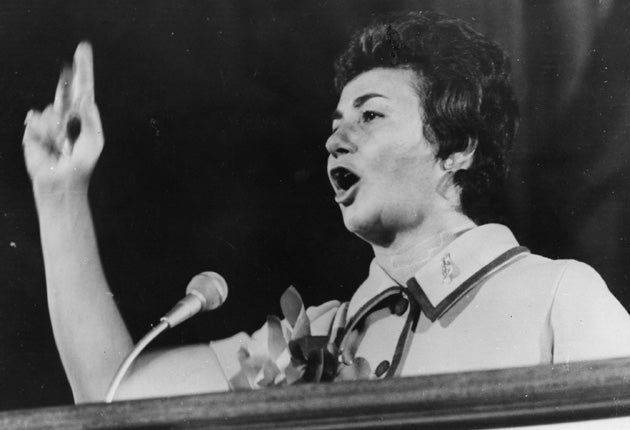Castro's sister admits to spying for the CIA
Disillusioned by the Cuban revolution, Juanita kept US informed about missiles

Your support helps us to tell the story
From reproductive rights to climate change to Big Tech, The Independent is on the ground when the story is developing. Whether it's investigating the financials of Elon Musk's pro-Trump PAC or producing our latest documentary, 'The A Word', which shines a light on the American women fighting for reproductive rights, we know how important it is to parse out the facts from the messaging.
At such a critical moment in US history, we need reporters on the ground. Your donation allows us to keep sending journalists to speak to both sides of the story.
The Independent is trusted by Americans across the entire political spectrum. And unlike many other quality news outlets, we choose not to lock Americans out of our reporting and analysis with paywalls. We believe quality journalism should be available to everyone, paid for by those who can afford it.
Your support makes all the difference.In a book published yesterday, Fidel Castro's sister, Juanita, reveals how she worked as an agent for the CIA against her brother for three years in the aftermath of Washington's failed Bay of Pigs invasion in 1961, at one point using an extract from Puccini's opera Madame Butterfly as a secret radio call sign.
The 432-page memoir, entitled My Brothers Fidel and Raul: The Secret Story, was co-written with the Spanish-language journalist Maria Antonieta Collins. According to the publisher, Santillana USA, Ms Castro dictated the content a decade ago, but refused to publish it until now.
In it Juanita – who at 76 is seven years younger than Fidel – recounts how she initially supported the 1959 revolution, only to become quickly disillusioned. Two years later, at the prompting of the wife of Brazil's ambassador to Cuba, she agreed to meet a CIA officer during a visit to Mexico City, ostensibly to visit a sister who was living there.
By then her house had become a sanctuary for anti-communists, while her eldest brother Ramon had been forced to give up the Castro family farm when it was taken over by the new communist regime. Fidel was already warning her against involvement with so-called "gusanos", or worms, as opponents of the revolution were known.
During the meeting with her CIA contact – later identified as Tony Sforza – Juanita made clear her unhappiness at how non-communists who had also worked for the overthrow of the dictator Fulgencio Batista were being forced out. She agreed to help the CIA, but on the strict condition that she would not take part in any violent activity against her brother. "This is my most important condition, moreover I would say it is the only condition," she told Mr Sforza, according to the book. She also refused to be paid for her collaboration.
Between 1961 and 1964, Juanita helped smuggle messages, money and documents back into Cuba. According to the book, she informed the CIA that Soviet missiles were being installed in Cuba, and increasing numbers of Russians were to be seen in the island. In 1962, the second year of her espionage activities, the Cuban missile crisis erupted, bringing the world closer to nuclear war than at any time before or since. Two years later she escaped to the US, and ran a pharmacy in Miami until retiring in 2007.
Join our commenting forum
Join thought-provoking conversations, follow other Independent readers and see their replies
Comments